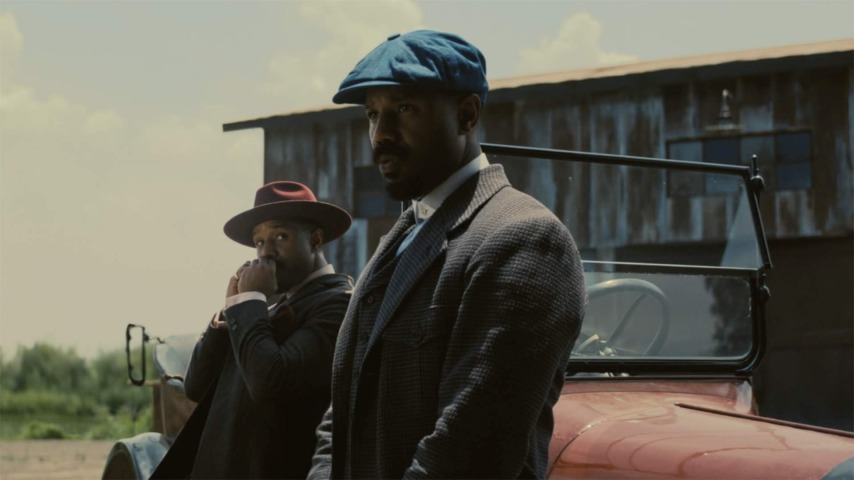Ryan Coogler genre-hops out of franchise territory with the ambitious pulp of Sinners
A potent film about vampires, racism, and music from the heart and the gut.
Photo: Warner Bros.
Smoke and Stack, twin brothers both played by Michael B. Jordan in Ryan Coogler’s Sinners, have whole pulp paperbacks’ worth of backstory the audience never sees: An abusive Mississippi childhood and young-adult romances, tours of duty in World War I, and a stint working with Al Capone in Chicago before they evidently ripped off the mob, pitting the Irish against the Italians and absconding with alcohol from both sides. Of course, most of this stuff—rough childhoods, Jim Crow struggles, the Great War, and prohibition (if perhaps not the working relationship with Mr. Capone)—is well within the realm of believability. But Coogler, who came to big-studio prominence revitalizing Rocky through the semi-sequel Creed and providing Marvel with its likely permanent high point Black Panther, has a way with mythologizing his characters without forgetting the very real pain that informs their lives. He can give a man (or two) a superhero-like backstory with a straight face. Sinners, which the filmmaker himself has been touting as his first wholly original feature (Fruitvale Station, his debut, was based on a real-life tragedy), is both Coogler’s most fantastical and most closely rooted in the history of American racism. It’s pulp from the heart and the gut.
Coogler picks up Smoke, the more sober-minded brother, and Stack, the flashier one, as they return to Mississippi in 1932. They intend to use their stockpile of alcohol and various local connections to start up a juke joint, first recruiting their younger cousin Sammie (Miles Caton), something of a blues guitar prodigy (and, naturally, the son of a disapproving pastor). In amazingly short order, they gin up a crew that includes older second musician Delta Slim (Delroy Lindo), cook Grace (Li Jun Li), singer Pearline (Jayme Lawson), and a couple of ex-lovers: Stack’s mixed-race childhood sweetheart Mary (Hailee Steinfeld), though her recollections of the last time they met are anything but childish; and Smoke’s beloved Annie (Wunmi Mosaku), bonded to him through tragedy.
Really, the first hour or so of Sinners consists largely of Smoke and Stack running errands; they close on the needed property together, then split up to take care of various business. (Given the abbreviated time frame, Smoke suggests pushing the opening; Stack wants to barrel forward.) Coogler, fresh off a couple of Marvel adventures that needed to maintain a certain shared-universe pace even as he gave them his own imprint, luxuriates in the time he’s able to take here, collaborating with cinematographer Autumn Durald Arkapaw to bring out the beauty of the Mississippi fields and skies while letting darkness envelop the individual characters at times. Even before night falls, characters’ faces are often half-covered in shadow. 65mm film, split between Ultra Panavision and IMAX cameras, provides a higher-contrast look than the same team’s Black Panther: Wakanda Forever, where potentially striking images were often lost in murk or digital tweaking.
Once the party gets underway, there are some romantic and personnel complications, and at one point, the brothers seem to be shooing Sammie away from their crime-adjacent life. It’s one moment in the film that feels inexplicable rather than indicative of unseen backstory, given that they brought him into the establishment in the first place. But these objections also turn moot when a trio of white folks turn up at the nascent club’s door and ask to be admitted. Suspicious, the staff initially denies entry, but the promise of patronage—the perilous economics of running a beloved juke joint quickly come into focus—is awfully tempting.
 Keep scrolling for more great stories.
Keep scrolling for more great stories.
